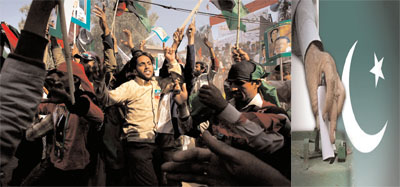LAHORE (TIP): All was quiet on the streets of Lahore on Friday as people geared up for the elections. The provincial government announced a holiday across Punjab around noon on Thursday, shutting down local businesses and giving people one extra day to get home to their villages to cast their vote in what appears to be the first historic elections since Zulfiquar Bhutto’s party, the PPP won the elections in 1977 by a wide margin. There are more than 200 parties in the electoral process, 86 million voters and 5,000 candidates.
Yet across the country there are only two names being bandied about: Imran Khan and Nawaz Sharif. The third hidden voice of the PPP’s Asif Ali Zardari is expected to emerge with news of the election results. Across social media, in cafes and on the roadside, there is a sense that Imran Khan – whether or not you support him – has roused election fever in everyone, not just the youth. The young, the middle aged and the youth are repeating the mantra “This is the first time I’m going to vote”.
Even those cynical about the elections process admit that the energy on ground is palpable. “Benazir Bhutto was the last charismatic leader we had,” said Shahvaar Ali Khan, a musician whose ad company, Farigh Four launched PTI’s media campaign for change with the slogan, “Naya Pakistan’ or a New Pakistan. “Now (the leader) is Imran despite his simplistic, yet sincere and honest political analysis.”
Indeed, in the urban centres of Pakistan many people, across the age spectrum are expressing their support for this reality. Some have read the PTI’s manifesto, many haven’t. But they’re hoping that Imran Khan will deliver guidance in governance, just as he did on the cricket field. This means that Sharif is finding a deep challenge in his stomping grounds. Across Lahore there is evidence that longtime former supporters of the PML-N aren’t going to vote for him. “I’m going to vote for Imran Khan,” said a businessman who didn’t want to be named.
“But I’m going to walk into my polling station announcing that I’m voting for Nawaz Sharif.” In Lahore on Thursday evening, the last day for rallying before today’s elections, people thronged on Mall Road, and around Liberty Market, the city’s commercial areas. Mothers came with their children dressed in their preferred party colours, many of them showing off the PTI’s red, white and green.
“I’m so excited. It was so much fun to see so many people all looking forward to a change,” said Moosa Baksh, a 21-year-old architecture student who joined the Liberty Market crowd with his friends. Asked what he’d feel if Imran Khan didn’t win. “I’ll be really sad,” he said. There is also a sense that Imran Khan’s superstar status is helping get women out of their homes and into the polling stations.
“In a lot of our families many of the husbands are voting for Nawaz Sharif and our wives are voting for Imran Khan,” said Mian Raza Mansha, a prominent Pakistani businessman. “I’ve heard a lot of men saying they’re going to try and prevent their wives from going to the polling stations,” he laughed. With so much focus on Pakistan’s big cities, it is unclear what the mood in Pakistan’s rural areas is, where a majority of the electorate lives.
Voters tied as serfs to their landowners have traditionally voted for their caste and biradari. PTI, with no links to the biradari system has promised to break that hold. In the cities there a sense of a newly mobilized voting class that has long been enfranchised to vote but has not felt compelled to make it to a polling station on elections day. Outside a polling station where workers were setting up the booths, three men sat outside discussing the potential election results.
“It’s going to be a hung parliament,” said Omar Farooq, 48, an electrician. “I’ve been listening to the radio all morning. ” “Nonsense,” said his friend, Asif Ali, 36. “It’s going to be an Imran Khan sweep. He’s going to take the entire country.”
